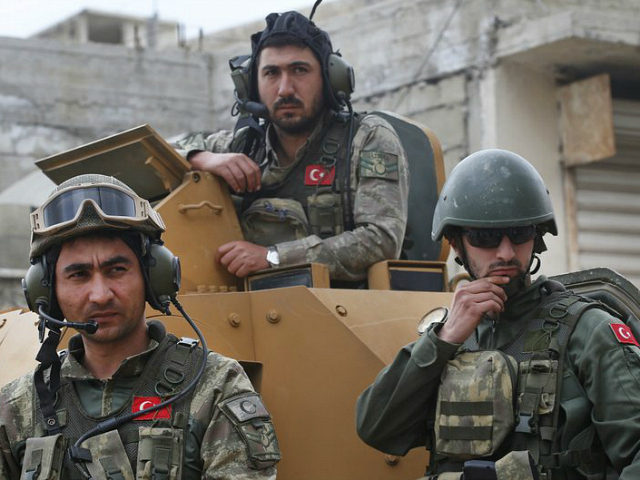Armenian Prime Minister Nikol Pashinyan said in a statement on Thursday that Turkey is attempting “to continue the Armenian Genocide” through its involvement in Yerevan’s dispute with neighboring Azerbaijan.
Fighting erupted last weekend on the border between Armenia and Azerbaijan over a region known as Nagorno-Karabakh, which is majority ethnic Armenian but falls within the established border of Azerbaijan, established during the Soviet era. Local Armenian separatists declared themselves the sovereign state of Artsakh in the aftermath of the collapse of the Soviet Union, leading to war in the 1990s followed by occasional skirmishes. Neither Armenia nor Azerbaijan recognizes Artsakh as a state, though Armenian officials hinted this week the nation may consider doing so in light of recent hostilities.
It remains unclear how the current hostilities began, as both sides claim the other began firing across the border. The fighting has expanded far beyond Nagorno-Karabakh in the last five days. On Thursday, Armenian officials reported that they had shot down an Azeri drone near Yerevan, the nation’s capital.
During the last round of skirmishes in Nagorno-Karabakh, the Azeri government threatened to bomb Armenia’s nuclear power plant, Metsamor.
“The Armenian side must not forget that our army’s state-of-the-art missile systems allow us to strike the Metsamor nuclear plant with precision, which could lead to a great catastrophe for Armenia,” Vagif Dargahli, a spokesman for the Azeri Defense Ministry, said.
Metsamor, a leftover of the Soviet era, is considered one of the world’s most dangerous nuclear plants due to its lack of containment mechanisms.
In his statement Thursday, Pashinyan accused Turkey, which has offered military support to Azerbaijan and stands accused of funneling Syrian fighters into Nagorno-Karabakh, of attempting to complete the Armenian Genocide of 1915, which Turkey still denies happened. Turkey killed as many as 1.2 million of the 1.5 million Armenians living in the Ottoman Empire at the time, in addition to annihilating other Christian populations like Assyrians and Greeks.
“Why has Turkey returned to the South Caucasus 100 years later? To continue the Armenian Genocide,” Pashinyan wrote. “For Turkey, however, continuing a genocidal policy is not only a means of implementing Armenophobia, but also a pragmatic task. Armenia and the Armenians of the South Caucasus are the last remaining obstacle on the way of continued Turkish expansion towards the North, the North East, and the East, and the realization of its imperialistic dream.”
“It is no longer merely the Karabakh issue, nor a security issue of the Armenian people. It is now an issue of international security, and today, the Armenian people are defending also international security, assuming what may be a new historic mission,” Pashinyan warned.
In a column published Friday, Ibrahim Karagül – the editor-in-chief of Yeni Safak, a Turkish newspaper favorable to Islamist President Recep Tayyip Erdogan – appeared to echo Pashinyan’s comments.
“After a century-long hiatus, Turkey’s geopolitical mind took action. This is a history-maker, region-builder mind that founded very powerful empires on earth. This power is a political gene,” Karagül wrote. “Our aim is not to spread conflicts but to replace, reinstate what rightfully belongs to us. Our aim is to keep alive and maintain our region, our people, our resources, our identity, and belonging.”
Karagül applauded the return of the “geopolitical mind in Turkey” to the Caucasus.
In an interview published on Thursday in Canada’s Globe and Mail, Pashinyan accused Turkey not just of offering Azerbaijan military equipment and mercenaries, but stated that the Turkish military itself was active in Nagorno-Karabakh.
“Turkey’s military personnel and the Turkish armed forces are directly engaged in the hostilities. Turkey’s NATO allies must explain why these F-16 jets are shelling towns and villages in Nagorno-Karabakh and killing civilian populations,” Pashinyan said. Armenia claimed it shot down an American-made F-16 fighter jet this week, which Ankara denied. The U.S. sells this equipment to Turkey as the country is a NATO member.
As a NATO country, Turkey may invoke Article 5 of the North Atlantic Treaty at any time, which states that an attack on one NATO member is an attack on them all, and all must respond with military action. Article 5 has come into play only one; the United States invoked it following the September 11, 2001, terrorist attacks.
In yet another interview, this time with the French magazine Le Figaro, Pashinyan demanded action on the part of the United States in response to American weaponry being used against Armenia.
“They [Azerbaijan] are using Turkish UAVs and F-16s to bomb civilian facilities in Nagorno-Karabakh. The international community, especially the American society, should be aware that U.S.-made F-16s are being used to kill Armenians in this conflict,” Pashinyan said. “There is evidence that Turkish military commanders are directly involved in the management of offensive operations. … We know that Turkey trained and transported thousands of mercenaries and terrorists from Turkey-controlled areas in northern Syria. Those terrorists are fighting against the Armenians today.”
The only formal response to the hostilities in the Caucasus from the United States has been a joint statement signed by President Donald Trump, alongside French President Emmanuel Macron and Russian President Vladimir Putin, urging a ceasefire.
On Friday, Erdogan accused Armenia of “despicable massacres” in Nagorno-Karabakh and insisted it would not stop playing a role in the region until the native Armenians of the region ended their “occupation.”

COMMENTS
Please let us know if you're having issues with commenting.